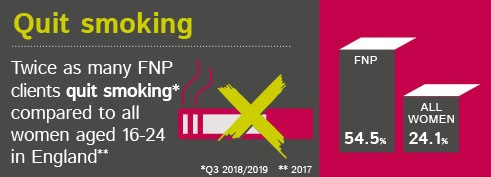What Mr Potato Head taught me about quality improvement
Alex Stevenson, Head of Communications and Insight at the Family Nurse Partnership National Unit
It’s a Wednesday morning at the end of February. I’m sitting at a table with a handful of FNP nurses, a Mr Potato Head toy and a stop watch. There’s a look of intense concentration on our faces as I time our best efforts to assemble our Mr Potato Head to match a picture in front of us as fast as we can.
We’re here to kick off a project about helping more FNP clients to quit smoking in pregnancy. How on earth is this going to help us tackle one of the most pressing public health problems in the UK?
Smoking in pregnancy is thought to result in up to 2,200 premature births, 5,000 miscarriages and 300 perinatal deaths every year in the UK. It poses serious, long-term health risks to both mother and child. No wonder, then, that reducing smoking during pregnancy is a key objective of the NHS Long Term Plan and The Department of Health and Social Care’s Tobacco Control Plan.
FNP data shows that FNP clients smoking at 36 weeks in pregnancy (23.0%) is at the lowest prevalence for three years.[i] The quit rate among FNP clients overall is more than double that for all women in the UK aged 16-24.[ii] These figures are encouraging, a testament to the hard work of family nurses and the commitment of FNP mums. But with such huge health risks at play, there’s still plenty of room for improvement.
And this is where Mr Potato Head comes in.
Quality improvement consultant Pete Dudgeon approaches our table with a keen eye for detail. It turns out our Mr Potato Head’s hat is on the wrong way around, his eyes are a bit wonky and his arm should be higher. We assembled him, imperfect as he was, in 49 seconds. This isn’t the best completion time in the room by a long way.
So how can we improve?
We go back to the drawing board: the ‘plan’ phase of this mini ‘plan, do, study, act’ cycle. Pete encourages us to make predictions. What process could drive better accuracy and at greater speed? We divvy up tasks and include a quality check. We set the timer and try again. We improve the accuracy but it all takes longer. Time to think again. We refine and practice, and we practice again.
There’s a healthy sense of competitiveness at the table and around the room. But this isn’t about winning or losing. It’s about learning the fundamentals of quality improvement. What we’re coming to understand is that it’s relatively easy to wheel our way through a ‘plan, do, study, act’ cycle. The real skill is in delving deeper into what we’re learning, using that well to develop more accurate predictions about what will work to improve things, and then implementing changes.
This is what 5 FNP teams will do over the next 6 months, working alongside colleagues in the FNP National Unit, to reduce the number of young FNP mums in their area who smoke in pregnancy. As a starting point, all family nurses involved in the project will take CO monitor readings at every visit during a client’s pregnancy. This will provide baseline data to measure outcomes over the course of the project. We will also seek regular feedback from nurses and clients so that we understand their experience of doing this work – and so we can better understand what is working and what isn’t. The 5 FNP teams will go on to implement changes that seek to improve clients’ quit smoking rates in a series of plan, do, study, act cycles between now and the end of July. All we learn will be shared with the whole FNP community – helping to build on the progress we’ve already made in recent years.
The aim of the project goes beyond improving quit smoking rates. It’s also about building capacity in local FNP teams and in the FNP National Unit to use quality improvement methods well, in response to local and national level FNP data. This will be the first project in an ongoing programme of quality improvement which helps ensure the programme is constantly fine-tuned and the best it possibly can be for young mums and their babies.
What I took away from the day, apart from a sense of nostalgia about a toy I hadn’t seen in 30 years, is the enormous potential of predictions.
FNP is known for its evidence base; its first RCT study was undertaken in 1977 and there have been at least four further RCTs in three different countries since then. This evidence base is important; it offers us confidence about what outcomes the programme has delivered for children and for mums.
Predictions, in the context of quality improvement, feel to me like they have enormous power to keep us focussed on the future, rather than the past; to ask not just whether it works, but also ‘how can we do better?’
[i] FNP National Unit: FNP programme data, Q3 2018/19
[ii] 54.5% of FNP clients stopped smoking by the end of Q3 2018/19, also the highest proportion over the last three years. This is more than double the percentage of all women aged 16 to 24 quitting smoking in England in 2017 (24.1%).
